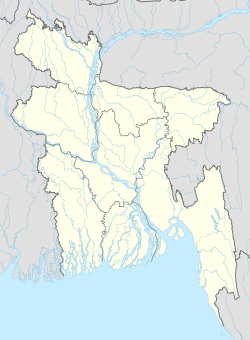Sitakunda or Sitakunda Town (Bengali: সীতাকুণ্ড শহর) is an administrative centre and the sole municipality (Paurashava) of Sitakunda Upazila in Chattogram District, located in Chattogram Division, Bangladesh. Sitakunda is famous for the Chandranath Temple and Hindus temple.[1] There is a hot water spring 5 km to the north of the town.[2]
Sitakunda
সীতাকুণ্ড | |
|---|---|
Town and municipality | |
clockwise: Chandranath Hill, Faqira Jame Mosque, Khoiyachora Waterfall, Guliakhali Beach, Ship Breaking Yard, Botanical Garden and Eco-Park | |
| Coordinates: 22°37′N 91°40′E / 22.62°N 91.66°E | |
| Country | |
| Region | Chittagong Division |
| District | Chittagong District |
| Area | |
| • Total | 28.63 km2 (11.05 sq mi) |
| Population | |
| • Total | 36,650 |
| • Density | 1,300/km2 (3,300/sq mi) |
| Time zone | UTC+6 (BST) |
Administration
editThe Sitakunda town has 9 wards divided into 22 mahallas, and a population of 36,650 distributed to 6,914 units of households (average household size 5.3), including 18,662 men and 17,988 women (the male:female ratio is 104:100).[3] [4][5] The most notable mahallas of the town are Yakubnagar, Nunachara, Mohadebpur, Sobanbagh, Bhuiyan Para, Chowdhury Para (also known as Premtala), Moulvi Para, Amirabad, Edilpur and Shibpur.[6]
Badiul Alam is the incumbent mayor of the town, he was first elected in 2015 and again in 2020 in the Sitakunda municipality election, he is a Awami League politician.
History
editTo reduce the population pressure on Chittagong, Sitakunda has been developed as a satellite town of the city, as well as a zone selected for industrial development along with Bhatiari.[7] The municipality is growing fast as an urban center, especially in and around Sitakunda and Mahadebpur mouzas where the Office of the Upazila Nirbahi Officer and other major Government offices, boys' high school and college are, but public services and facilities like electricity, drinking water, drainage and garbage disposal are under-provided.[8]
Geography
editThe town, situated on an unbroken flat land of alluvial deposits that lies below the level of high tide, is free from tidal effects and flash floods of the area due to an embankment.[8]
Climate
edit| Climate data for Sitakunda (1991–2020) | |||||||||||||
|---|---|---|---|---|---|---|---|---|---|---|---|---|---|
| Month | Jan | Feb | Mar | Apr | May | Jun | Jul | Aug | Sep | Oct | Nov | Dec | Year |
| Record high °C (°F) | 32.2 (90.0) |
35.7 (96.3) |
39.1 (102.4) |
40.2 (104.4) |
39.0 (102.2) |
36.8 (98.2) |
36.4 (97.5) |
37.2 (99.0) |
38.6 (101.5) |
36.7 (98.1) |
36.0 (96.8) |
32.7 (90.9) |
40.2 (104.4) |
| Mean daily maximum °C (°F) | 26.9 (80.4) |
29.5 (85.1) |
32.0 (89.6) |
32.8 (91.0) |
32.8 (91.0) |
31.8 (89.2) |
31.1 (88.0) |
31.6 (88.9) |
32.2 (90.0) |
32.4 (90.3) |
30.7 (87.3) |
27.9 (82.2) |
31.0 (87.8) |
| Daily mean °C (°F) | 18.0 (64.4) |
21.2 (70.2) |
25.2 (77.4) |
27.7 (81.9) |
28.3 (82.9) |
28.2 (82.8) |
27.7 (81.9) |
27.9 (82.2) |
28.0 (82.4) |
27.1 (80.8) |
23.5 (74.3) |
19.4 (66.9) |
25.2 (77.4) |
| Mean daily minimum °C (°F) | 11.7 (53.1) |
14.6 (58.3) |
19.7 (67.5) |
23.4 (74.1) |
24.8 (76.6) |
25.6 (78.1) |
25.5 (77.9) |
25.4 (77.7) |
25.2 (77.4) |
23.6 (74.5) |
18.6 (65.5) |
13.6 (56.5) |
21.0 (69.8) |
| Record low °C (°F) | 5.7 (42.3) |
6.5 (43.7) |
10.5 (50.9) |
16.7 (62.1) |
19.3 (66.7) |
21.0 (69.8) |
23.0 (73.4) |
21.0 (69.8) |
21.4 (70.5) |
17.8 (64.0) |
11.7 (53.1) |
5.7 (42.3) |
5.7 (42.3) |
| Average precipitation mm (inches) | 7 (0.3) |
27 (1.1) |
58 (2.3) |
144 (5.7) |
349 (13.7) |
613 (24.1) |
761 (30.0) |
593 (23.3) |
424 (16.7) |
230 (9.1) |
40 (1.6) |
6 (0.2) |
3,252 (128.0) |
| Average precipitation days (≥ 1 mm) | 1 | 2 | 3 | 7 | 14 | 20 | 23 | 23 | 19 | 11 | 2 | 1 | 126 |
| Mean monthly sunshine hours | 202.1 | 206.8 | 233.1 | 222.5 | 199.8 | 152.0 | 141.8 | 152.8 | 163.9 | 204.5 | 218.7 | 211.5 | 2,309.5 |
| Source: NOAA[9] | |||||||||||||
References
edit- ^ Prem Ranjan Dev, "Of Shiva Chaturdashi and Sitakunda", The Daily Star (Dhaka), 2007-02-07. Retrieved on 2009-02-02
- ^ Mohammed Abdul Baten & Rashedul Tusher, "Time to move to green energy", The Daily Star (Dhaka), 2007-02-07. Retrieved on 2009-02-02
- ^ "Area, Population and Literacy Rate by Paurashava- 2001" (PDF). Population Census Wing, BBS. Archived from the original (PDF) on 2008-12-17. Retrieved 2007-09-03.
- ^ "Household and Population of Statistical Metropolitan Areas in Bangladesh - 2001" (PDF). Population Census Wing, BBS. Archived from the original (PDF) on 2007-09-28. Retrieved 2007-09-03.
- ^ Chowdhury, Shimul Kumar (2012). "Sitakunda Upazila". In Islam, Sirajul; Jamal, Ahmed A. (eds.). Banglapedia: National Encyclopedia of Bangladesh (Second ed.). Asiatic Society of Bangladesh.
- ^ "Sitakunda Upazila: Census Results at a Glance - 2001 (Community Series)" (PDF). Population Census Wing, BBS. Retrieved 2007-09-03.
- ^ Urban mass transportation for Chittagong - I, Imon Chowdhooree and Kanu Kumar Das, The Daily Star, Urban Page, 2005-04-08; retrieved: 2007-09-18
- ^ a b Land Use Plan of Sitakunda Paurashava Archived 2010-02-15 at the Wayback Machine; Urban Development Directorate, Government of Bangladesh, 2006; retrieved: 2007-08-28
- ^ "World Meteorological Organization Climate Normals for 1991-2020 — Sitakunda". National Oceanic and Atmospheric Administration. Retrieved June 16, 2024.






